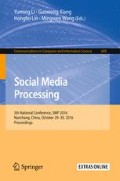Abstract
Given a message, cascade prediction aims to predict the individuals who will potentially retweet it. Most existing methods either exploit demographical, structural, and temporal features for prediction, or explicitly rely on particular information diffusion models. Recently, researchers attempt to design fully data-driven methods for cascade prediction (i.e., without requiring human-defined features or information diffusion models), directly leveraging historical cascades to learn interpersonal proximity and then making prediction based on the learned proximity. One widely-used method to represent interpersonal proximity is social embedding, i.e., each individual is embedded into a low-dimensional latent metric space. One challenging problem is to design cost-effective method to learn social embedding from cascades. In this paper, we propose a position-aware asymmetric embedding method to effectively learn social embedding for cascade prediction. Different from existing methods where individuals are embedded into a single latent space, our method embeds each individual into two latent spaces: a latent influence space and a latent susceptibility space. Furthermore, our method employs the occurrence position of individuals in cascades to improve the learning efficiency of social embedding. We validate the proposed method on a dataset extracted from Sina Weibo. Experimental results demonstrate that the proposed model outperforms state-of-the-art social embedding methods at both learning efficiency and prediction accuracy.
Access this chapter
Tax calculation will be finalised at checkout
Purchases are for personal use only
References
Szabo, G., Huberman, B.A.: Predicting the popularity of online content. Commun. ACM 53(8), 80–88 (2010)
Bao, P., Shen, H.W., Jin, X., Cheng, X.Q.: Modeling and predicting popularity dynamics of microblogs using self-excited hawkes processes. In: Proceedings of WWW 2015 Companion, pp. 9–10 (2015)
Shen, H., Wang, D., Song, C., Barabási, A.L.: Modeling and predicting popularity dynamics via reinforced poisson process. In: Proceedings of AAAI 2014, pp. 291–297 (2014)
Gao, S., Ma, J., Chen, Z.: Modeling and predicting retweeting dynamics on microblogging platforms. In: Proceedings of WSDM 2015, pp. 107–116 (2015)
Zhao, Q., Erdogdu, M.A., He, H.Y., Rajaraman, A., Leskovec, J.: Seismic: a self-exciting point process model for predicting tweet popularity. In: Proceedings of KDD 2015, pp. 1513–1522 (2015)
Gao, J., Shen, H., Liu, S., Cheng, X.: Modeling and predicting retweeting dynamics via a mixture process. In: Proceedings WWW 2016 Companion, pp. 33–34 (2016)
Kempe, D., Kleinberg, J., Tardos, É.: Maximizing the spread of influence through a social network. In: Proceedings of KDD 2003, pp. 137–146 (2003)
Chen, W., Wang, Y., Yang, S.: Efficient influence maximization in social networks. In: Proceedings KDD 2009, pp. 199–208 (2009)
Cheng, S., Shen, H., Huang, J., Zhang, G., Cheng, X.: StaticGreedy: solving the scalability-accuracy dilemma in influence maximization. In: Proceedings of CIKM 2013, pp. 509–518 (2013)
Gomez Rodriguez, M., Leskovec, J., Krause, A.: Inferring networks of diffusion and influence. In: Proceedings of KDD 2010, pp. 1019–1028 (2010)
Myers, S., Leskovec, J.: On the convexity of latent social network inference. In: Proceedings of NIPS 2010, pp. 1741–1749 (2010)
Rodriguez, M.G., Balduzzi, D., Schölkopf, B.: Uncovering the temporal dynamics of diffusion networks (2011). arXiv:1105.0697
Wang, L., Ermon, S., Hopcroft, J.E.: Feature-enhanced probabilistic models for diffusion network inference. In: Flach, P.A., De Bie, T., Cristianini, N. (eds.) ECML PKDD 2012, Part II. LNCS, vol. 7524, pp. 499–514. Springer, Heidelberg (2012)
Wang, Y., Shen, H., Liu, S., Cheng, X.: Learning user-specific latent influence and susceptibility from information cascades. In: Proceedings of AAAI 2015, pp. 477–483 (2015)
Bourigault, S., Lagnier, C., Lamprier, S., Denoyer, L., Gallinari, P.: Learning social network embeddings for predicting information diffusion. In: Proceedings of WSDM 2014, pp. 393–402 (2014)
Guille, A., Hacid, H.: A predictive model for the temporal dynamics of information diffusion in online social networks. In: Proceedings of WWW 2012, pp. 1145–1152 (2012)
Bao, P., Shen, H.W., Huang, J., Cheng, X.Q.: Popularity prediction in microblogging network: a case study on Sina Weibo. In: Proceedings of WWW 2013 Companion, pp. 177–178 (2013)
Lagnier, C., Denoyer, L., Gaussier, E., Gallinari, P.: Predicting information diffusion in social networks using content and users profiles. In: Proceedings of NIPS 2013, pp. 74–85 (2013)
Goldenberg, J., Libai, B., Muller, E.: Talk of the network: a complex systems look at the underlying process of word-of-mouth. Market. Lett. 12(3), 211–223 (2001)
Aral, S., Walker, D.: Identifying influential and susceptible members of social networks. Science 337(6092), 337–341 (2012)
Niu, S., Guo, J., Lan, Y., Cheng, X.: Top-k learning to rank: labeling, ranking and evaluation. In :Proceedings SIGIR 2012, pp. 751–760 (2012)
Cao, Y., Xu, J., Liu, T.Y., Li, H., Huang, Y., Hon, H.W.: Adapting ranking SVM to document retrieval. In: Proceedings of SIGIR 2006, pp. 186–193 (2006)
Koren, Y., Bell, R., Volinsky, C.: Matrix factorization techniques for recommender systems. IEEE Comput. 8, 42–49 (2009)
Du, N., Song, L., Smola, A., Yuan, M.: Learning Networks of Heterogeneous Influence. In: Proceedings of NIPS 2012, pp. 2780–2788 (2012)
Acknowledgments
This research is supported by the National Hi-Tech R&D Program of China (863 program) under grant number 2014AA01A302 and 2014AA015103, the National Key Research and Development Program of China (2016YFB0201404), and the National Natural Science Foundation of China (61202215, 61232010).
Author information
Authors and Affiliations
Corresponding author
Editor information
Editors and Affiliations
Rights and permissions
Copyright information
© 2016 Springer Nature Singapore Pte Ltd.
About this paper
Cite this paper
Liu, W., Shen, H., Ouyang, W., Fu, G., Zha, L., Cheng, X. (2016). Learning Cost-Effective Social Embedding for Cascade Prediction. In: Li, Y., Xiang, G., Lin, H., Wang, M. (eds) Social Media Processing. SMP 2016. Communications in Computer and Information Science, vol 669. Springer, Singapore. https://doi.org/10.1007/978-981-10-2993-6_1
Download citation
DOI: https://doi.org/10.1007/978-981-10-2993-6_1
Published:
Publisher Name: Springer, Singapore
Print ISBN: 978-981-10-2992-9
Online ISBN: 978-981-10-2993-6
eBook Packages: Computer ScienceComputer Science (R0)

